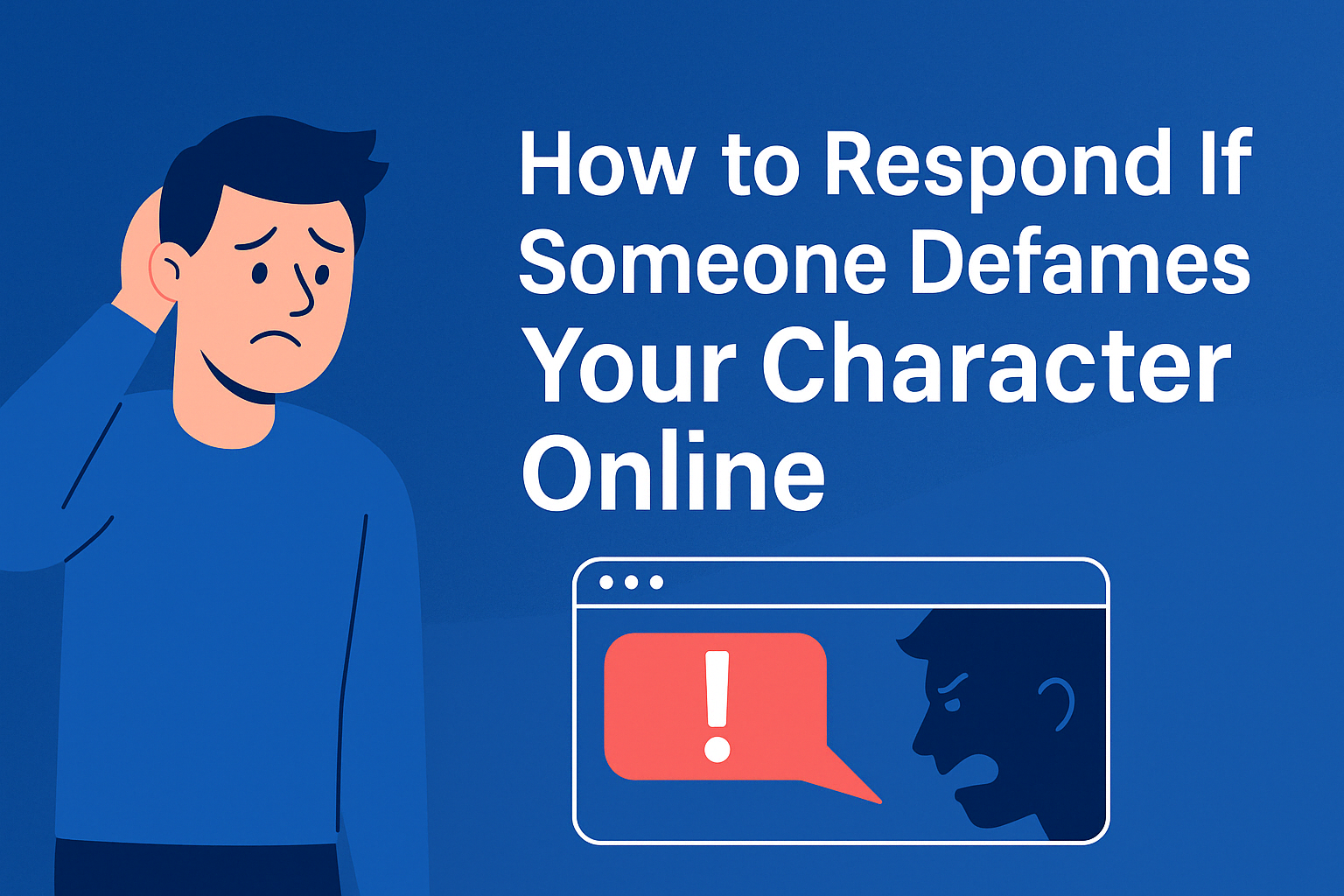Estimated reading time: 5 minutes
Table Of Content
Understanding Online Defamation
Online defamation occurs when false, harmful statements are published on the internet, damaging someone’s personal or professional reputation. There are two common forms:
- Libel: Written defamation (e.g., blog posts, comments, articles)
- Slander: Spoken defamation (e.g., podcasts, videos, livestreams)
Whether it’s a social media smear campaign or a defamatory Google review, your reputation is at stake—and legal rights are on your side.
Defamation laws vary slightly by state and country, but the basic principles are rooted in protecting individuals from baseless character attacks. The impact of defamatory content can be far-reaching, especially in the internet age where posts can go viral quickly, often before victims have a chance to respond.
Initial Steps: Stay Calm and Collect Evidence
It’s natural to feel anger or panic. But your first response should be strategic, not emotional.
Step-by-Step Checklist:
- Take screenshots of the defamatory content (including URLs and user profiles)
- Note dates, times, and platforms where the content was posted
- Identify the author if possible (check usernames, email addresses, IPs)
- Check for violations of platform guidelines or terms of service
- Document the harm (loss of business, missed opportunities, personal distress)
Save all documentation securely. You may need it for legal action or content removal requests. Creating a timeline can also help you track the progression of the defamation and your response efforts.
Evaluate the Defamation
Before acting, assess whether the content meets the criteria of defamation:
Key Elements of Defamation:
- The statement is false
- It was published to a third party
- It caused reputational harm
- It was made with negligence or malicious intent
Courts will also consider whether the statement is one of fact or opinion. Protected opinions, satire, and fair comment are typically not actionable unless they imply false facts.
If the statements are true, opinion-based, or protected speech, your legal options may be limited—but not nonexistent. You may still counteract them through public relations, content suppression, and online reputation management.
Report the Defamatory Content
Most platforms provide tools to report content that violates community standards.
Where to Report:
- Facebook: Report a post
- X (formerly Twitter): Report abusive content
- Google: Defamation removal request
- YouTube: Submit a complaint
- Glassdoor, Reddit, Yelp, and other sites also have reporting mechanisms
Provide clear evidence, explain how the content violates the rules, and request removal. Be professional and concise in all communications.
Craft a Professional Response (or Don’t)
Public responses can backfire if handled poorly. However, in some cases, a measured reply can help correct misinformation.
When to Respond:
- The audience is your professional network
- The comment is gaining traction
- You can confidently disprove the claim
Sample Response:
“This statement is false and misrepresents the facts. I encourage anyone with concerns to contact me directly or view accurate information at [your website or LinkedIn].”
Avoid emotional language. Never retaliate with insults or threats. Instead, assert your position with professionalism and grace.
If you’re unsure about responding, consult with a reputation expert or attorney. In many cases, silence or taking the matter offline is more effective.
Seek Legal Support
If reporting and polite engagement fail, legal action may be necessary. Options include:
- Sending a cease and desist letter
- Filing a defamation lawsuit
- Requesting court-ordered content removal
Criteria for Legal Success:
- Clear proof of harm
- Verified identity of the author
- Jurisdiction over the defendant
Attorneys can also help you navigate complex issues like anonymous defamation, platform immunity under Section 230, and proving damages.
If you can prove malice or actual damage to your business or career, you may be eligible for compensation.
Use SEO to Bury Defamatory Content
Search engine optimization (SEO) isn’t just for businesses. You can reclaim your online presence by pushing damaging results down.
Tactics to Improve Online Reputation:
- Publish fresh blog posts or news articles with your name
- Optimize your LinkedIn, personal website, and business pages
- Share professional press releases
- Contribute to authority platforms (e.g., Medium, Quora, academic blogs)
- Build social profiles and maintain consistent branding across platforms
SEO suppression is a proven method to counteract online libel by flooding the web with positive or neutral content.
How Defamation Defenders Can Help
At Defamation Defenders, we specialize in reputation repair and defamation defense. Our services include:
- Investigating defamatory sources
- Filing takedown and legal notices
- Suppressing negative content through SEO
- Building positive online assets that restore trust
- Monitoring and alerting for future defamatory incidents
📞 Contact us today for a free consultation
Let us help you turn the page on harmful content and protect your name from further damage.
Frequently Asked Questions
Online defamation includes false and damaging statements posted on websites, blogs, or social media platforms that harm a person or business’s reputation.
Not directly. Instead, document everything and consider legal or professional action. Confronting someone may escalate the situation.
In some cases, yes—through a “Doe” lawsuit to reveal anonymous posters. These cases often involve subpoenaing ISPs and platforms.
It depends on your state, but the statute of limitations is typically 1–3 years from the date of publication.
Yes, if they are false, damaging, and not based on actual experience. You must prove falsity and harm.
We can help monitor and remove recurring defamatory content across platforms. Automated tools and watchlists are available.
Yes, but only under certain legal circumstances. A court order or proof of illegality is often required.
No, but legal representation adds credibility and increases the chance of compliance.
Absolutely. Employers often conduct background checks, and defamatory content can influence hiring decisions.
Costs vary based on the severity and scope, but reputation services typically start in the low thousands. Lawsuits are more costly but may result in damages.
Related Content You Might Find Useful:



